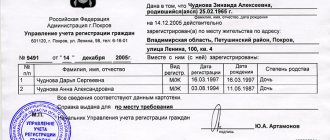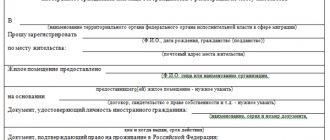The need to temporarily register a minor at a new address may arise due to various life circumstances. When moving to a new place of residence with their parents (other legal representatives), minors are registered with them for up to 90 days, as otherwise they risk receiving an administrative fine for failure to comply with registration rules.
It is noteworthy that not only a citizen who lives for more than 90 days in a given locality without registration at a specific address will be fined, but also the homeowner who provided living space for a fee or free of charge and did not monitor the registration of residents. Individuals and legal entities are subject to a fine as an administrative penalty.
Today we will talk about the temporary registration of a minor child, as well as the consequences for a homeowner who decides to register a child in his living space.
Registration at place of residence: main points
The concept of “registration at the place of residence” has replaced the concept of “permanent registration”. Today these two definitions are used in parallel. The place of permanent registration of a particular person is a house, apartment, or other residential premises.
For a citizen to legally reside at a specific address, for example, the following grounds are needed:
- the housing is owned by him and his family members;
- apartment or house is rented;
- social hiring and other grounds provided by law.
What rights does a child have regarding registration after a divorce?
After the breakdown of the marital relationship, the child has the full right to registration at his previous place of residence , if there are no other options. It will not be possible to discharge the offspring - the law does not approve of this.
And if the child is registered with the father, what are the rights of the mother? The owner of the living space has the right to discharge the ex-wife immediately after the court ruling enters into legal force, but he will not be able to deprive the child of registration.
Another thing is if the mother with whom the offspring remains has the opportunity to obtain registration in another place, then the child will automatically be registered with her .
It even happens that a minor child remains registered in his father’s apartment, but in fact his and his mother’s place of residence is located at a different address . This is not entirely correct; it is desirable that the actual address coincides with the place of registration.
Is it necessary to register a child at his place of residence?
For minor citizens of the state, registration is also mandatory.
This requirement is reflected in the following regulations:
- Civil Code of the Russian Federation (Article 20);
- Family Code of the Russian Federation;
- Order of the Ministry of Internal Affairs of Russia dated December 31, 2021 No. 984 “On approval of the Administrative Regulations of the Ministry of Internal Affairs of the Russian Federation for the provision of public services for registration of citizens of the Russian Federation at the place of stay and place of residence within the Russian Federation”;
- Rules for registration and deregistration of citizens of the Russian Federation at the place of stay and place of residence within the Russian Federation (approved by Government Decree No. 713 of July 17, 1995).
These documents regulate all issues related to registration (both permanent and temporary); in particular, they provide for the registration of children at the place of residence of one of the parents. The child’s place of residence, according to Article 20 of the Civil Code of the Russian Federation, is considered to be the place of residence of the parents (or one of them, if family members are registered in different places).
Some parents are thinking about the question: is it necessary to register a child at all, since an additional registered person affects the calculation of standards for the consumption of utility services and other indicators? Legislative answer: yes, it is necessary. Firstly, there are penalties for a child’s lack of registration; secondly, without formal registration it is impossible to register at a clinic, enroll in a kindergarten or school, apply for benefits and required material payments, etc.
So, the sooner parents take care of this issue, the fewer problems they will have, including bureaucratic red tape.
Private apartment
If the apartment participated in privatization or was purchased, you must ask the owner or all co-owners for permission to move in. After a person’s 14th birthday, the issue of a person’s registration is resolved separately; for younger wards, registration is issued if the mother is registered.
If the mother is registered with the baby, no one has the right to prevent her from moving in. If the mother actually stays at the ward’s address without registering, she faces administrative liability in accordance with Art. 19.15.1 Code of Administrative Offences.
Deadlines for registering a child
Adult citizens know that when moving they need to obtain permanent registration within 7 days. For children, this period is also relevant, but in the case of temporary registration of a child, his parents are given 3 months to solve the problem.
Important: the weekly period is counted not from birth, but from the day of moving into a given living space or receiving a birth certificate (for newborns). After all, the baby and mother may spend some time in the maternity hospital. At this time, this institution is their actual place of residence.
Registration of children: options and life situations
The rules by which a newborn is registered at the place of residence in 2021 provide for various life circumstances.
Sometimes relatives or owners of residential premises are “against” the registration of a child, sometimes, on the contrary, grandparents want to register their grandchildren with them in order to qualify for improved living conditions.
The ideal option is when the parents are registered and live together, but complete families registered at the same address are not always found. In this case, the place of residence of children in the event of separation of parents is established according to the requirements of the law and mutual agreements.
We will consider the main situations for which the procedure for action is legally approved.
If parents are registered at their place of stay
A fairly common situation is when a young family lives in a rented apartment under a rental agreement. The documents define the terms of registration.
In this case, the child is registered together with them (or one of the parents, if only one is registered). The father or mother needs to contact the local passport office with a corresponding application. The owner puts his signature on the papers. However, this is more of a notification than a permission: the landlord has no right to prohibit the registration of a minor.
Some homeowners do not want to register a family with a child in their apartment, fearing claims for living space and other troubles. Any lawyer will tell those who are particularly wary that under a temporary lease agreement no one will be able to take away his property, but he will face a fine for citizens living in their premises without registration.
In addition, the owner’s persistence in this matter makes the life of a family with a child problematic. After all, they will not be able to go to the clinic or process payments. So here, too, we need to appeal to humanity.
Both parents are permanently registered at the same address
If the father and mother are “permanently” registered at the same address, registration at the child’s place of residence after birth will take place here, and the parents do not have to be homeowners.
As in the case of temporary registration, the owner of the apartment will not need consent to register a small citizen in his living space. We wrote about the arguments and procedure in the event of the owner’s refusal to sign the accompanying documents in the previous paragraph.
In addition to personal presence and a handwritten signature, the owner of the apartment can also certify consent to registration with a notary. The document has legal force, and the owner does not have to come to the passport office in person.
Parents are registered at different addresses
The greatest number of controversial issues arise if parents have registration in different places. In this case, the issue of registering a small citizen is resolved by mutual agreement or in court. Government authorities make decisions based on the interests of the child.
Registration at the place of registration of the mother
The child traditionally lives more often with his mother. Therefore, we will consider the option of “addressed” registration of a child in the case of parents’ registration in different places using the example of just such a situation. This implies that the father and mother have a good relationship (whether they are married or not) and there are no disputes regarding the place of residence of the son (daughter).
Probably, not everyone knows how to register a newborn at the place of residence; the mother, for example, needs to fill out an application with a request to register the child at her address. In addition, the father needs to attach his written consent and documents that prove that the baby is not registered with him. This could be an extract from the house register or a certificate from the place of residence.
Registration at the place of registration of the father
Similarly, by mutual agreement, the child’s registration is issued at the place of residence of the father, who writes an application requesting registration, and a certificate is taken from the mother that the child is not registered at her address. In this case, the mother also needs to write a statement of consent to register the baby in the father’s living space.
However, situations are different. Since the courts and the public most often side with the mother, and she does not want to sign the consent, in case of controversial issues, the father will need to prove that it is more appropriate to register the child with him.
If there is no father's consent, how to register the child with the mother
The father may also refuse to consent to the registration of the child at the mother’s place of residence. The information and reference portal “State State” states that if the baby is registered in the mother’s living space (or at her registered address), only her application is needed. A separate consent document from the father is not required.
However, in fact, the authorized bodies refuse to register a child at the mother’s place of residence if the father is registered separately and has not given written permission. What to do in this case? According to the law, this situation is not legal, therefore, the passport office’s refusal to register can be appealed in court by providing strong evidence of the unfair actions of the former spouse.
No additional consent will be required to register a child if the marriage has not been registered and the father is not included in the child’s birth certificate.
Mom also needs to know that additional consent from dad is not required if he:
- deprived of parental rights;
- died;
- declared missing or incompetent.
Registering a child with the father, if his relatives are against it
If the parents are divorced and the mother does not have permanent registration (or it is temporary), it would be logical to register the child with the father. The relatives with whom he (the father) lives may be against it, since, in their opinion, in such a situation it is possible for the mother to register at the child’s place of residence.
To be fair, it should be noted that the child’s mother cannot lay claim to their living space, because the baby’s registration with the parent occurs without hindrance, but not vice versa. So the relatives’ fears are unfounded: the baby’s mother can move into their living space only with their (the owners’) consent.
In addition, the mother has no legal grounds to demand that the baby be registered at the father’s place of residence. There are no provisions in the regulations according to which the father can be obliged to register the child at the place of residence of the parents. This can only be done upon his personal application.
Which country would you rather live in? ⚡ Take the test in 2 minutes
If relatives want to register the child with them
Another common situation: a young family lives with their parents. In this case, the child is registered at this place of residence only if the mother or father is registered.
Sometimes the good goals of relatives regarding the registration of a small family member can be combined with practical intentions:
- claims for a subsidy for housing and communal services - the amount of assistance is calculated based on the number of registered residents and their total income;
- deliberate deterioration of living conditions - according to sanitary rules, a certain area must be allocated for each person in a living space. If this standard is not met and there are a lot of people “huddling” in the apartment, the family can apply for improved living conditions. This is stated in Art. 51 of the Housing Code of the Russian Federation. It is for this purpose that the father may be registered at the child’s place of residence;
- the desire to receive a larger amount of compensation or additional living space when demolishing a house in disrepair - the homeowner mistakenly believes that the greater the number of registered persons, the greater the amount due to him when moving from the disrepair premises. However, his calculations and expectations in this case are incorrect and in vain: the amount of compensation is calculated exclusively from the market value of the housing and does not depend on the registered residents.
In any case, when registering with such relatives, parents must take into account, first of all, the child’s interests and needs.
If the child was born abroad
A separate case is if a child is born to Russian parents outside the state. When returning home to register for registration at the address of the father or mother, problems may arise. This is due to the fact that when crossing the border, a person (even one born a few days ago) must be a citizen of some country. What to do in this case?
It's simple: parents need to get a certificate from the maternity hospital with all the information about the baby and contact the Russian consulate. In this case, the child will be granted citizenship by birthright, since the parents are citizens of the Russian Federation.
After arriving home, you should visit the GUVM office to register.
The court will decide
For those representatives of families who gave birth to a child, but were unable to choose the most acceptable option for residence and registration for the baby, the RF IC has paragraph 3 of Article 65, according to which the court will, of its own free will, determine this place .
In this case, the interests of the minor are placed at the forefront, and the opinion of the offspring himself matters, if he is already 10 years old.
One of the four who is categorically determined, for the benefit of the child, to register him with himself, must draw up and submit a statement of claim to the district court , in which he states the following:
- it is possible to create good living and study conditions for a son or daughter, since there is a comfortable apartment with sufficient space;
- Having a permanent job with a decent salary allows you to provide a comfortable existence for your child;
- the other parent does not have his own home and cannot provide the child with the proper level of well-being.
Next, when formulating a request to the court, you should ask for the possibility of the child living and registering at this address, and withhold alimony from the defendant.
Since the trial is taking place with the participation of representatives of the PLO , the best option for further residence and registration of the baby will be chosen.
In order to win back the child, but not for the sake of a desire to annoy the ex-spouse, but precisely for the good of the child, it is important to correctly state the motivation when drawing up an application , so it is better to entrust this important matter to a lawyer, a specialist in cases of this kind.
Registration of a child under 14 years of age
While the child is young (according to Russian laws, he is considered up to 14 years old), registration of minor children at the place of residence of the parents occurs at the will and decision of the father or mother, who fills out an application for the child. The main document - the basis for registration - is the baby's birth certificate.
If the parents cannot agree on the place of registration of the child, the decision is made by the court. The interests of the minor are taken into account for objective reasons; the child himself is not asked in this situation.
Municipal housing
If the housing belongs to the municipality, and citizens live in the apartment under a social tenancy agreement, according to Article 70 of the Housing Code of the Russian Federation, you will have to obtain consent:
- Responsible tenant.
- Every resident.
- Registered but temporarily absent persons.
If the number of meters in the apartment is less than required by the standards, 1 more person may be refused admission to the apartment, since the family will need to improve their living conditions. The consent of residents for registration is drawn up in writing according to the sample.
Important! A citizen under the age of 14 will not be registered in a municipal apartment if the parents decide to arrange separate residence for the ward without a mother or father.
Registration of a child aged 14 to 18 years
In the case of partially capable persons (children from 14 to 18 years of age), the rules for registering minor citizens at their place of residence imply taking into account their opinions when resolving controversial issues. This means that if the parents divorce, the child can choose who to live with and where to register. The application is filled out in person, and the identity document is no longer a birth certificate, but a passport.
From this age, he can also register with other relatives, for example, with his grandparents, although separately from his parents, but also with their written consent.
Disputes between parents
The current legislation determines that a dispute arising between parents can be resolved peacefully or in court. Disagreements between former spouses are most often caused not only by personal hostility, but also by everyday reasons. There are often cases when, after a divorce, people live not just in different houses, but also in different settlements. The remoteness of the actual location may make it difficult for one of the former spouses to communicate with the baby. In such situations, everyone tries to keep the child with themselves.
It should be noted that the mother and father have equal rights in this case. However, the child's opinion is also taken into account.
A package of documents for registering a child
The mandatory list of documents for registering a newborn at the place of residence includes:
- statement;
- ID cards of the child’s legal representatives (originals and photocopies), most often the parents’ passports. If the child is being raised by a stepfather and mother, attach the passports of the adoptive parents or guardians;
- birth certificate (from 14 years of age - passport) of the child.
In addition, depending on the situation, you may additionally need:
- extracts from personal accounts or house books;
- consent of the second parent and a certificate stating that the child is not registered with him (if the father and mother are registered at different addresses);
- marriage certificate, etc.
Most often, registration is issued with the mother, otherwise an application from the father is provided with a request to register the child at his place of residence.
Summary
A child is born, which means he is already a small member of society. This means that it needs to be registered in accordance with the rules established by the legislation of the Russian Federation. The issue of registering a child causes a lot of misunderstanding and difficulties.
All Russian citizens, even newborns, must be registered at their address of residence and stay.
Responsibility for registering newborns rests with their legal representatives: parents or guardians.
Without registration, the baby will not receive medical care and social support. If you take into account the necessary knowledge outlined in this article, the procedure for registering a baby will seem to you just a pleasant concern about the legal status of your child, nothing more.
Where to submit documents
Parents (adoptive parents, guardians), when choosing where to register their child at their place of residence, can use one of several options:
- contact the passport office (the corresponding department of the Main Directorate for Migration of the Ministry of Internal Affairs of the Russian Federation);
- submit papers through the multifunctional center;
- fill out an application on the State Services portal.
If the choice falls on the passport office, you need to go to the one that is located closer to the place of registration; it is under its jurisdiction that the registration address is located. The application (it is written on the spot) and the prepared package of documents are handed over to the receptionist.
Multifunctional Center
Recently, multifunctional centers can also register newborns. The work is organized according to the “single window” principle. Employees of the institution check and accept the package of papers, and in due time issue a certificate of registration in the form established by the Administrative Regulations, that is, everything is the same as in the passport office.
Public services portal
Those who do not want to waste time going to the GUVM or MFC office can use the State Services portal; an increasingly large part of the population is resorting to this modern and convenient method of online registration, including permanent registration.
Registration of a child at the place of residence through State Services is carried out in several steps:
- registration on the resource;
- filling out an application indicating information about yourself and the child, as well as the document on the basis of which registration is made;
- waiting for test results;
- visiting the Main Directorate for Migration and Migration with original documents at the appointed time. The employee verifies the details of IDs and other papers and issues a certificate of registration.
Possible problems during registration
The algorithm for registering a child at the place of residence described on paper is simple and quick, but depending on the situation, certain difficulties may arise.
Thus, one of the obstacles may be the refusal of the owner of the premises to appear before government agencies and attest to the fact of registration. Although the owner’s permission is not officially required to register a child, in fact, a certificate will not be issued without his signature. We described earlier what to do in this case.
Another problem is created directly by the parents themselves; for example, it happens when the father and mother do not live together and cannot mutually resolve the issue of who will have the child registered. Most often, the baby is registered with the mother, but life circumstances may change. If a son (daughter) moves to his father, the latter is forced to decide how to re-register the child at another place of residence in his own living space.
Temporary registration of a child
Places of stay (temporary registration) are hotels, campsites, medical and recreational institutions and other similar institutions that imply accommodation for a relatively short period of time. Registration at the place of stay of adults and children in such establishments (for example, hotels) is most often carried out by its employees.
Temporary registration must also be issued if a citizen (both an adult and a minor) lives outside the place of permanent registration for more than 90 days. In this case, the parents themselves deal with the issue.
Certificate of registration as confirmation of registration
The result of the completed permanent registration is:
- certificate of registration at the place of residence, form No. 8 - for children under 14 years of age;
- stamp in the internal passport - for children 14-18 years old.
Above we wrote about where to obtain a certificate of registration at the place of residence.
Form No. 8 is a kind of annex to the birth certificate and contains the following information:
- last name, first name, patronymic of the little citizen, his date of birth;
- the full address at which it is registered;
- information about the document on the basis of which it was issued and to which it is an attachment (birth certificate);
- issuing authority and date of registration;
- signature of an authorized official and seal of the institution.
To confirm temporary registration, a certificate is issued in Form No. 3. To certify the fact of registration of children at a specific address, a certificate of registration at the child’s place of residence in Form No. 9 can also be used. It contains information not only about the baby, but also about all residents, registered at a certain moment in the room.











